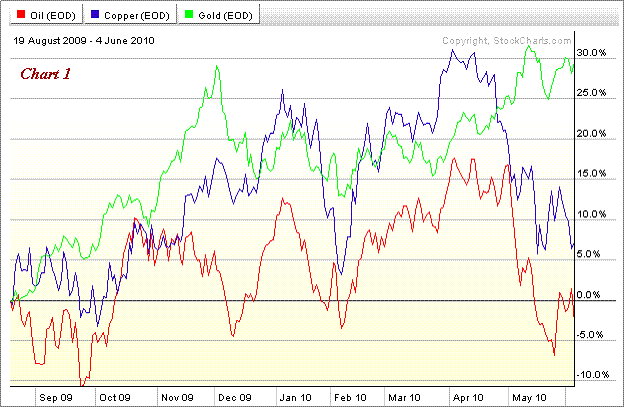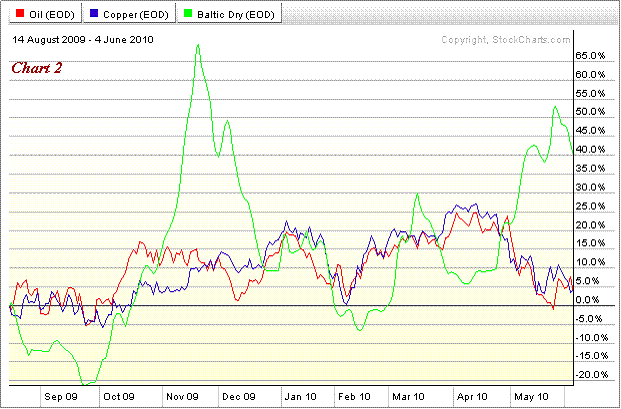Crude Oil and Copper Better Value Than Gold
Commodities / Commodities Trading Jun 07, 2010 - 02:54 AM GMTBy: Dian_L_Chu
 There have been some nice pullbacks in commodities like copper and crude (Chart 1), which should trend significantly higher by year-end. Both crude oil and copper tumbled after the Labor Department May jobs report and the fear about Europe heightened by the total clueless-about-financial-markets comment from Hungary’s Prime Minister.
There have been some nice pullbacks in commodities like copper and crude (Chart 1), which should trend significantly higher by year-end. Both crude oil and copper tumbled after the Labor Department May jobs report and the fear about Europe heightened by the total clueless-about-financial-markets comment from Hungary’s Prime Minister.

Crude oil declined the most in four month with July delivery dropping 4.3%, to $71.40 a barrel, while Copper for July delivery also lost 4.3%, to settle at $2.81 a pound. Meanwhile, gold for August delivery, bucking the trend, added $7.70, or 0.6%, to $1,217.70. (Chart 1)
Copper, Crude vs. Gold
Copper and crude oil are both base essentials heavily reliant upon by economies globally for everyday usage, with no meaningful substitution options. Gold, on the other hand, is not as essential to keep the everyday world running seamlessly, and could conceivably be substituted by other commodities with a change in global monetary standard or people’s perception.
From that perspective, I think there are a few recent trends pertaining to crude and copper that are being misinterpreted or overlooked by the market, and I will discuss some of them here.
China Destocking = Future Strategic Buying
One recent trend that worries the market is that China appears to be eating into some of its commodities reserves. Imports from China in markets such as refined copper, iron ore and lead have declined in the last few months, which could also be a factor behind the recent drop in prices for those commodities.
This has prompted several investment banks sending teams of analysts to China to gauge actual demand. Through field visits and data mining, the analysts have concluded that Chinese domestic demand still is strong. They surmise commodity imports are declining at least partly because the country and its industrial companies are tapping reserves, possibly because they expect prices to fall further, reports the Wall Street Journal.
It is conceivable that China could be taking advantage of its market position putting downward pressure on current commodity price levels through destocking. This tactic could set the stage for a fairly strong strategic buying from China in order to rebuild the stocks depleted over the last several years. Metals such as copper will be needed for China's aggressive infrastructure program and to hedge its foreign reserves against possible currency devaluation in the future.
Higher Cost Base by Tax & Restrictions
In addition, there are two recent events—the Aussie mining tax, and the expected future restrictions regarding deep-water drilling in the U.S. —that are currently being overlooked by the market.
These two new developments mean that costs for getting both commodities out of the ground/sea and to consumers are going up, miners now have higher profitability thresholds to meet in evaluating future projects, and the current drilling moratorium and future legislation is sure to increase the per barrel extraction costs, and decrease future supply, thereby causing the price of oil and copper to rise considerably in the future.
BDI Suggests Contango Trade
With this recent pullback in both of these commodities, coupled with low storage costs right now due to many available cargo ships and unoccupied warehouse space available, smart investors are going to buy these commodities and store them just like central banks store Gold causing the available spot market supply to go down, thereby raising future prices.
So, with such relatively low available storage costs, and new regulatory restrictions guaranteeing higher prices in the future, market players are putting crude oil and copper into storage, similar to storing gold in a vault, as an inflation and currency devaluation hedge.

This probably partly explains the recent run-up of the Baltic Dry Bulk Index (BDI), and the decoupling of BDI with the prices of crude oil and copper, as the BDI typically should have a positive correlation with the price of commodities. (Chart 2)
Red, Black and Gold – The Same Glitter
It seems highly probable that Crude Oil and Copper, although not as glamorous as Gold, are actually the better commodity plays going forward. Expect Oil to be well over $100 a barrel in 2011, and Copper to break the $5 a pound barrier as well.
Jobs Picture To Improve
This all assumes that we don’t have the end of the world depression scenario. But despite all the negativity and over-reactionary tendencies of modern culture, it seems that human civilization continues to improve processes, invent new technologies, and overall improve the quality of life of each successive generation.
As such, and to reiterate my previous article regarding the May jobs report, there will be plenty of future jobs required along the way as civilization advances towards greater achievements, so rather than the latest jobs report being viewed as a dismal failure on a short-term analysis, the overall jobs trend is quite bullish and the economic recovery is still intact (as confirmed by the majority of economic data for the week.)
Out of Treasuries, Into Oil & Copper
Once investors recover from their initial reaction to hide out in treasuries, the fed rate of zero percent for the rest of the year makes this an unattractive place to be unless the world is coming to an end, which I think is an unlikely scenario.
Since the Fed is incentivizing investors to take risks, to spur economic growth and move the ongoing recovery forward, it makes rationale sense to move out of treasuries into growth assets like Oil and Copper which remain critical components in any economic recovery, and are cheaper than ever on an inflation adjusted basis within this paradigm of unprecedented loose monetary policy.
(Note: Some of the commodity related investment options were discussed in my earlier article - Commodities: Time to Go Long nd Physical.)
Dian L. Chu, M.B.A., C.P.M. and Chartered Economist, is a market analyst and financial writer regularly contributing to Seeking Alpha, Zero Hedge, and other major investment websites. Ms. Chu has been syndicated to Reuters, USA Today, NPR, and BusinessWeek. She blogs at Economic Forecasts & Opinions.
© 2010 Copyright Dian L. Chu - All Rights Reserved Disclaimer: The above is a matter of opinion provided for general information purposes only and is not intended as investment advice. Information and analysis above are derived from sources and utilising methods believed to be reliable, but we cannot accept responsibility for any losses you may incur as a result of this analysis. Individuals should consult with their personal financial advisors.
© 2005-2022 http://www.MarketOracle.co.uk - The Market Oracle is a FREE Daily Financial Markets Analysis & Forecasting online publication.



